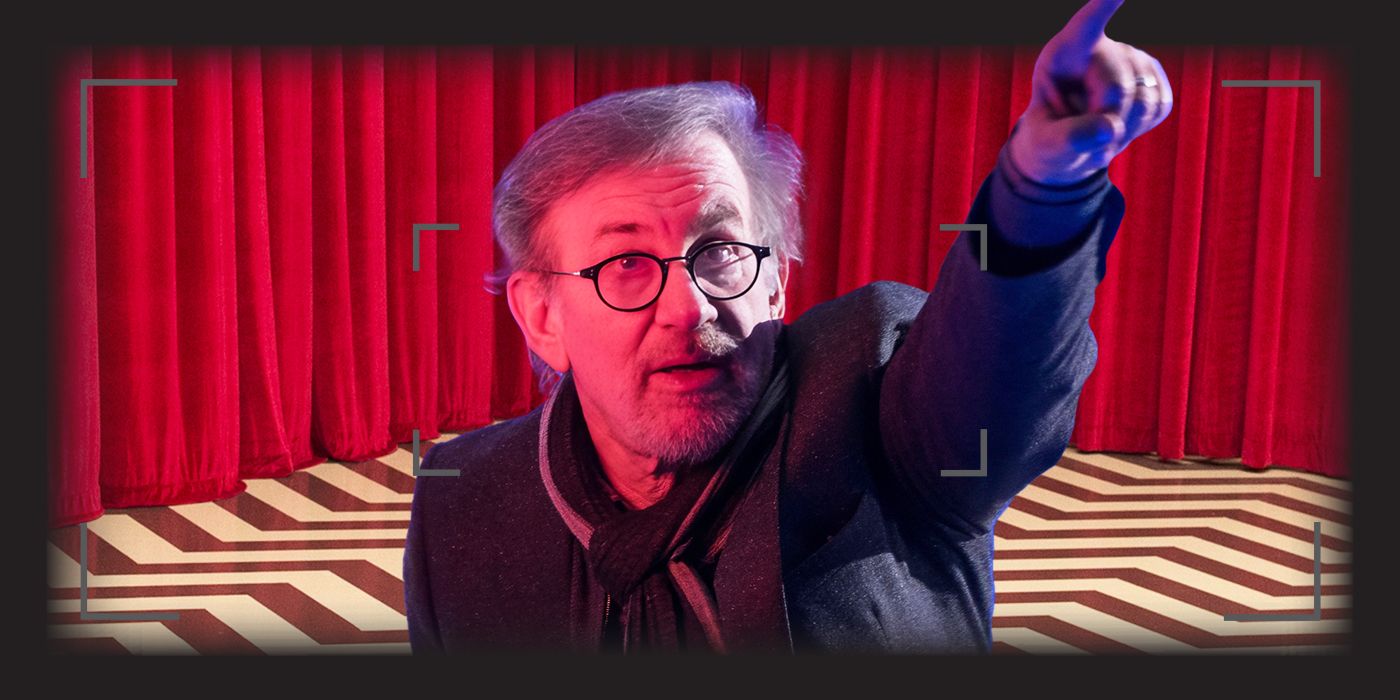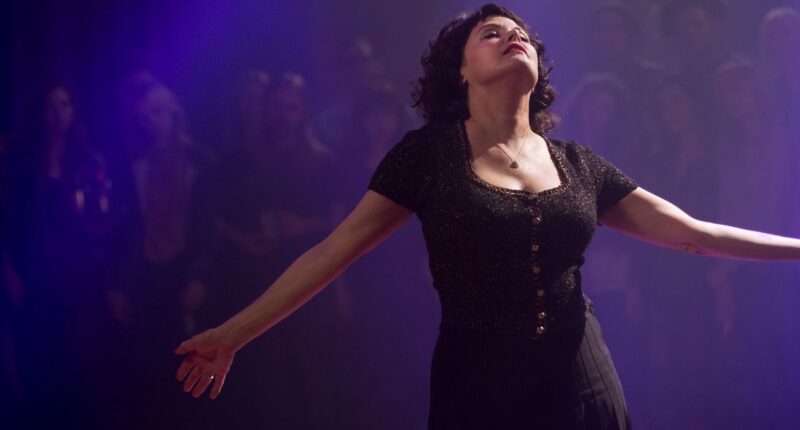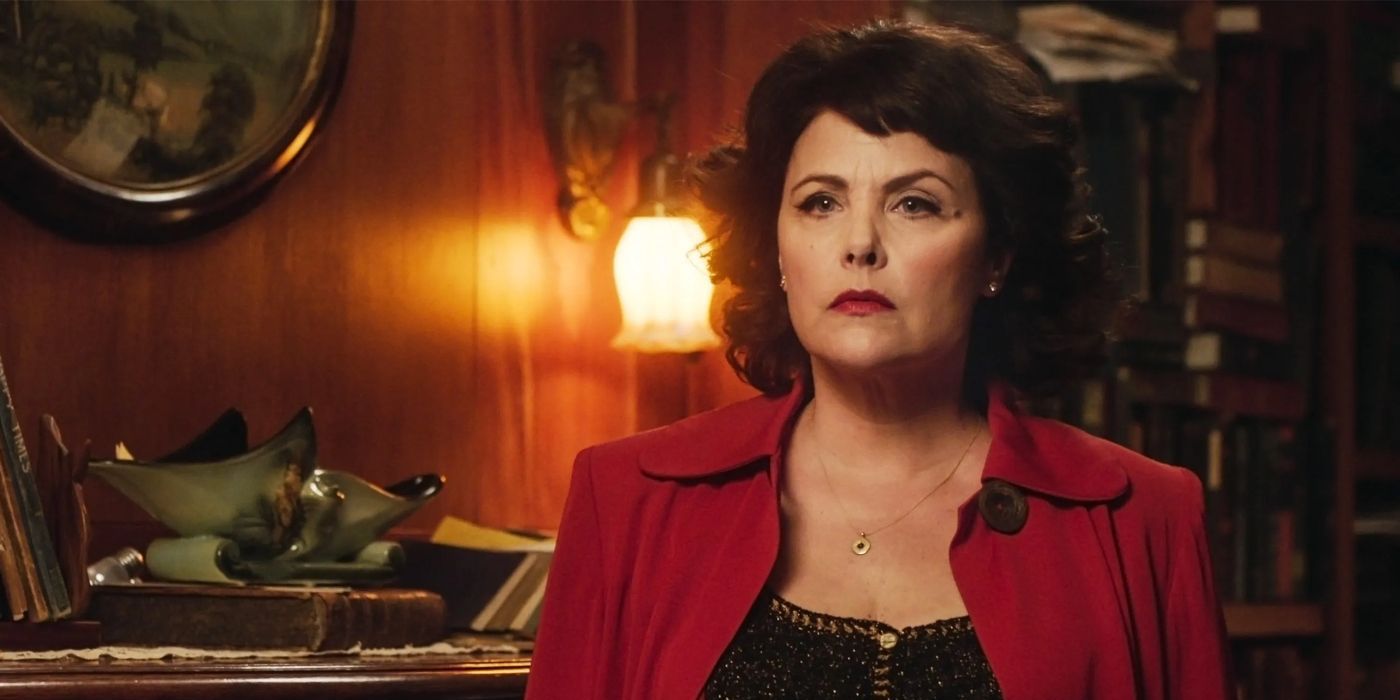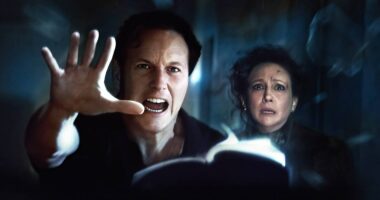Editor’s note: The below contains mentions of sexual assault.
Audrey Horne (Sherilyn Fenn) is as indelible a part of Twin Peaks‘ iconography as the coffee, the surrealist idiosyncrasies, and the existential dread. The swaying daydreamer in her patterned skirts and red heels, the rebellious daughter compensating for her paternal neglect by playing at maturity, and an amateur-yet-ingenious film noir heroine in the making — but always an 18-year-old young woman who isn’t immune to more age-appropriate behaviors, like wistfully casting Dale Cooper (Kyle MacLachlan) as a noble savior who can sweep her away from her dreadful life. Sometimes, Audrey tries on complementary aesthetics for size, and at other times, those archetypes clash. Every Twin Peaks teenager is broken in some way; Audrey just hides her afflictions better.
A sizable chunk of viewers, myself included, spent Twin Peaks: The Return holding our breath to see if Audrey had survived Season 2’s explosive cliffhanger. While technically a “yes,” the nebulous specifics are as grim as the rest of Season 3, a project that — thanks to the unrated freedom streaming television provides — hews closer to the moody elegance and recurring motifs of co-creator David Lynch‘s filmography than the first two seasons. Do I love what befalls my favorite Twin Peaks character in The Return? Not at all. Would I give grace to other male creators if they were behind Audrey’s storyline? Heck, I didn’t give Lynch himself grace when The Return aired in 2017. I was indignant because he smashed up what I wanted to see, as if I didn’t appreciate that as one of his specialties. Rewatching Twin Peaks after Lynch’s passing with a deeper appreciation for all the different tree branches that make up his vision, as well as reflecting on how my biases affected my initial response, I’ve realized that Audrey’s distressing conclusion perfectly slots into Twin Peaks‘ mythology — a teenager exposed to darkness when she was too young, who becomes an adult woman facing her world’s most sinister, predictable psychological crevices.
‘Twin Peaks: The Return’ Crushed My High Hopes About Audrey Horne’s Ending
There’s a good chance the ways Season 2 fumbles the ball with Audrey predisposed me to approach Season 3 with extra-intense anticipation. Losing Lynch and Mark Frost, his Twin Peaks co-creator, means the majority of the series’ sophomore effort is a mixed bag. When taken as a whole, Audrey’s Season 2 experience — turned into a damsel-in-distress, shuffled into a decent but uninspiring romance, her passionate frustrations channeled into civil activism — feels dismissive and incongruous with what came before. It’s almost like the series doesn’t know how to develop the potential Lynch and Frost had established, so it resorts to clichés too directionless for a girl who might follow a jazzy beat if she likes it, but always dances to the music in her head.
Twin Peaks: The Return, on the other hand, had me enthralled from moment one. When Audrey took 11 episodes to appear, I started drumming my fingers, but I trusted the process. Once she does arrive, we discover she’s stuck in a loveless marriage to Charlie (Clark Middleton), an accountant. To maybe no one’s surprise, however, Audrey’s unruly streak manifests through her bitterly flaunting her extramarital affair in Charlie’s face. Having a lover might be one of her only freedoms — whenever she tries to leave her home, she can’t. Is it her emotional trauma? Some supernatural interference? Or is it because the confines of her reality are fracturing around her, and Audrey realizes as much without fully understanding it yet?
Audrey’s Bleak, Brutal Situation Reflects the World of ‘Twin Peaks’
The cold, bleak facts we do know about Audrey’s reality are that BOB possesses Mr. C, Cooper’s depraved doppelgänger, and rapes Audrey not long after his exit from the Black Lodge. She then becomes a single mother to Twin Peaks‘ version of the Antichrist, Richard (Eamon Farren). If she wakes from her coma following the bank vault explosion, as Frost’s Twin Peaks: The Final Dossier companion book technically confirms, Audrey becomes a recluse, eventually opening a beauty salon but never leaving her haunted hometown.
Circa The Return, she’s trapped in a miserable marriage to an average, uninspiring husband incapable of matching her fiery drive or her enthusiastic curiosity. Unable to assert her independence by venturing beyond her house, she spins her wheels, her frustration relentless. Eventually, Audrey almost collapses into a state that certain men would label “hysterical.” She’s a woman liable to be ignored or institutionalized because she’s become a burden to the men in her life, not a complex human whose trauma deserves professional help.
Frost’s The Final Dossier refuses to clarify Audrey’s final fate. Doing so would contradict one of his late creative partner’s signature approaches to fiction. Audrey’s failed marriage could be a fact. Like all of Lynch’s works, it could also be a metaphor or even an alternate reality — she might be an unwilling patient in a mental health facility, or trapped in another Lodge, or still in that coma. Whatever the truth, our last image of Audrey is her wearing all-white in an all-white room, staring at her makeup-less reflection in a mirror, and screaming.

Related
Steven Spielberg Almost Directed an Episode of ‘Twin Peaks’
Oh, what could have been…
Adding insult to personal injury, Audrey never reunites with Cooper. Of course, any romance between the two during Twin Peaks‘ initial run would’ve been wildly inappropriate. Of course, because it’s fiction, I still wanted a much older Audrey, shaped and matured by her life experiences, to get her man — and Dale to re-discover his headstrong girl Friday — once their power dynamic had balanced into equality. Even removing romance from the equation, however, one of Twin Peaks‘ biggest dynamics all but evaporated.
David Lynch’s Violent Motifs in ‘Twin Peaks: The Return’ Are Compassionate, Not Exploitative
This outcome wholeheartedly irritated me during my first, second, and even my third watches. Unlike Diane (Laura Dern), who suddenly became a crucial character with a somewhat surprising romance with Cooper — surprising, given his established affection for Annie Blackburn (Heather Graham) — Audrey felt ousted to the sidelines once again. Even though a Black Lodge doppelgänger is the only way that David Lynch would stoop to meaningless fan service, her story read like crumbs tossed out to sate the viewers. Perhaps most importantly, it felt too cruel for the elemental force of a young woman we knew so well, even for Twin Peaks.
With distance, yes, it’s cruel — but not sadistic or graphic. Audrey’s circumstances, both the confirmed and unexplained aspects, reinforce Lynch’s foundational concepts. Many of his films incorporate violence against women or address the male capacity for violence: take Blue Velvet, Wild at Heart, Lost Highway, and, of course, Twin Peaks: Fire Walk With Me, a spin-off prequel starring the heart and soul of his longest-running universe, Laura Palmer (Sheryl Lee). Personally, even though some of Lynch’s narratives surrounding these topics fall into tropes, he’s one of the only male directors I’ve never felt threatened by when they reflect on and grapple with their gender’s most repellent side.
Instead, I’ve sensed compassion in both the presentation and the reasoning behind it. Fire Walk With Me, for example, is a transcendent artistic achievement because it’s the waking nightmare of a tormented young woman whose exhaustive saga never eroticizes her, even during the scenes of her abuse. A similar approach applies to Diane, another survivor of Mr. C, the Dale Cooper lookalike possessed by an entity hypothesized as embodying “the evil that men do.” Laura, Maddy Ferguson, Diane, Audrey — this is supposed to be a cyclical tragedy.
Audrey’s Ambiguity in ‘Twin Peaks: The Return’ Is Painful but Purposeful
At the time, I didn’t frame Audrey’s resolution (such as it is) with these perspectives. Neither did I appreciate how every moment The Return spends with Audrey inside her own living hell prioritizes her reactions to that hell. Considering the above examples, that’s not a surprising move for Lynch. The Return lifts Audrey free from Season 2’s floundering B-plots into an adult woman with the ashy taste of failed dreams in her mouth. Life has caught up to her, and it’s continued to egregiously disappoint, betray, and chain her down instead of giving her the freedom she’s always craved — the unlimited autonomy those myths about adulthood promise us. Her dance at the Roadhouse might seem like a beautifully needless indulgence, but it’s probably the first time Audrey has been true to herself in years; everyone even clears space for her self-expression, turning their eyes onto her and her alone. But an angry, jealous man disrupts her brief moment in the spotlight. The reality of an everyday bar brawl, and Audrey’s fervent desire to escape it all, shatters the twin illusions of choice and celebration.
What initially seems meandering and then insulting to Audrey is actually Twin Peaks: The Return having her test the edges of her unfair world — shaking the bars of her various cages with bitterness, rage, and grief, whatever form those cages take. It’s no wonder Audrey screams when she sees herself in the mirror. Would I still have preferred to see Audrey incorporated into the main story? Without pitting women I appreciate against each other, do I still think certain new characters nudge her into a secondary spot? Yes, on both counts. Sometimes, though, we’re not supposed to get what we want. A disturbing outcome being a male creator’s “point” never excuses poor representation, but if The Return does Audrey Horne dirty, it’s according to the structure of her established world — one which has always produced beauty and horror in equal measure. If that isn’t entirely in line with Lynch and The Return, then what is?











